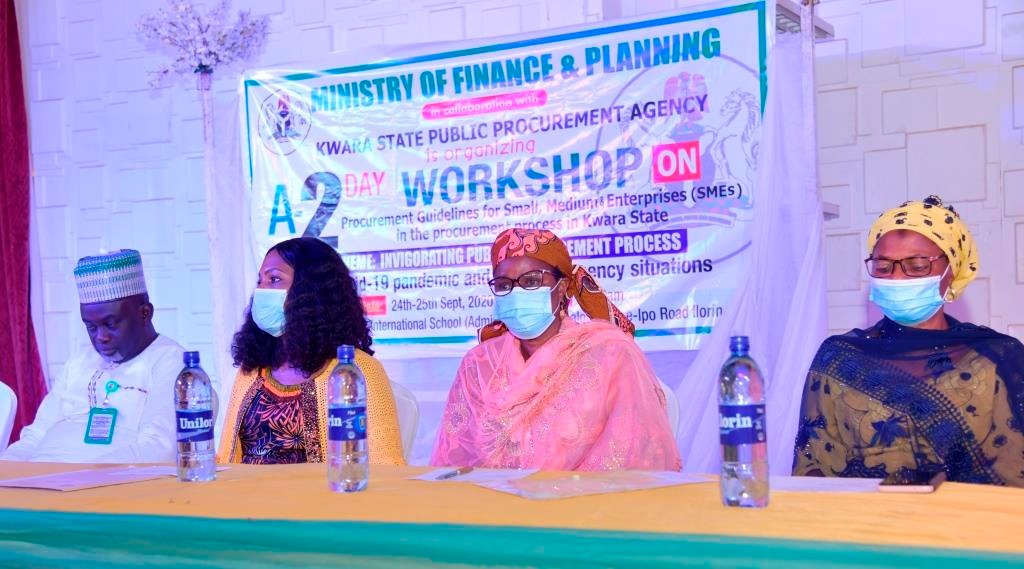 Kwara State Government says the public procurement agency was created in the state to promote probity and equip the small, medium and enterprises (SMEs) to win and execute government contracts
Kwara State Government says the public procurement agency was created in the state to promote probity and equip the small, medium and enterprises (SMEs) to win and execute government contracts
State Commissioner for Finance and Planning, and chairperson of the State Public Procurement Agency, Mrs. Florence Oyeyemi Olasumbo told participants at a 2-day Workshop organized for Small, Medium and Enterprises (SMEs) on procurement guidelines, held at the Roemichs International School, Ilorin, the state capital.
She said this forms part of the post covid19 economy recovery plan by the state government as to strengthen local contractors, saying the birth of the agency would negate the tradition of satisfying multiple requirements in several MDAs ahead of securing a contract from government.
" Prior to now, Nigeria was among the few African countries without legislation on public procurement, but today, the story is totally different. It is this direction that kwara state government is following by putting in place all the necessary structures and regulatory authorities responsible for the monitoring and oversight of Public Procurement. This government has taken this bold step to establish the agency in order to promote an era of seamless public procurement, probity and accountability in doing government business. This is part of the promise that the Executive Governor of the state, Mallam AbdulRahman AbdulRazaq has made to the good people of the state," she said.
Mrs. Olasumbo, however, said that a number of the policies that have been put in place to ease the jobs of the agency include the reviewing of all levies attached to contract services like registration and tender fees, and access to online publication of procurement law and some relevant charges among others.
The Commissioner stressed that the agency will not downplay bidders' experience as part of basic requirements for bidding process, saying this is another area the procurement act will be looking into so as to award contracts to those that can execute them at maximum capacity.
In his remarks, the Commissioner for Enterprises, Alhaji AbdulWahab Agbaje said the programme came at the right time, noting that it shows the government's commitment to assisting small business owners, who he said, need basic knowledge and skill to sustain their means of livelihood.
" You need to have knowledge and skill that can guide you in running businesses. When fund is available, if technical know-how is lacking, then there is no way to attain desired success at ease," Agbaje told participants at the workshop.
Engineer Rotimi Iliasu, Commissioner for Works, and his counterpart at Health, Dr. Raji Razaq, in their separate submissions, held that the programme is in fulfillment of the Governor's manifestos as to build the gap between the rich and poor, which they said, achievable by providing supports for SMEs to thrive.
Dr. Yemisi Adeyeye, Chairperson, Neca's Network of Entrepreneurial Women, (NNEW), kwara state branch and a participant expressed her delight at the way government is committed to building the capacity of young entrepreneurs and to advance their chances for survival in the business environment.
" It is a brilliant thing for kwara state government to think of involving the small and medium enterprise in the public procurement programme of the state. And from the information gathered here today it is a new regime; you don't have to know anyone in partaking in contract procurement since you have all qualifications. My advice for the agency is that they should be a mentoring platform for younger entrepreneurs for them to be part of the government business, because youths are ready to take part," she said.
Another participant, Builder Omokanye Raphael, chairman, Nigeria Institute of Building, kwara state branch, drew attention of government to the importance of incorporating their members in the process of awarding contract for construction, claiming that such will enable the institute to prevail on any contractor construction project to execute a quality job.
Earlier, in his lecture, AbdulRahman Toyin Jimoh, from University of Ilorin, who took participants through the four stages involved in bidding process - Pre-qualification, qualification, Tendering and Post - qualification, emphasized that none of these stages are inconsequential to both Tender Board and the bidders.
He charged prospective bidders to always have details of the bidding advert and provide answers required of them before undertaking a bid, noting that any failure at this would amount to their disqualification.
Jimoh also advocated that the State public procurement agency should always be carried along in all activities of the affected Tender Board and that the former be allowed to issue a certificate of no objection before mobilizing bidders with funds for job execution.
Most of the participants lauded the governor's resolve to widen the scope of opportunity for indigenous contractors to secure contracts, as demonstrated via this platform.




Comments powered by CComment